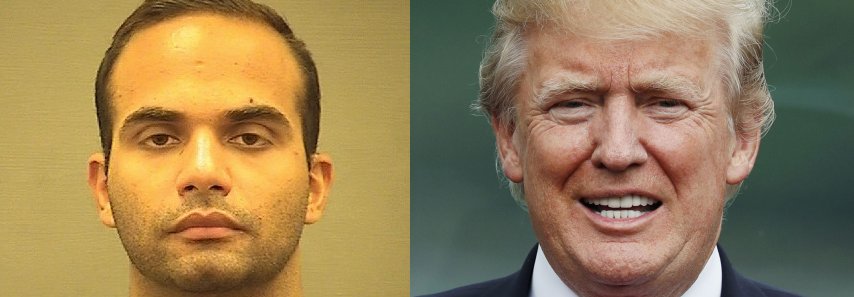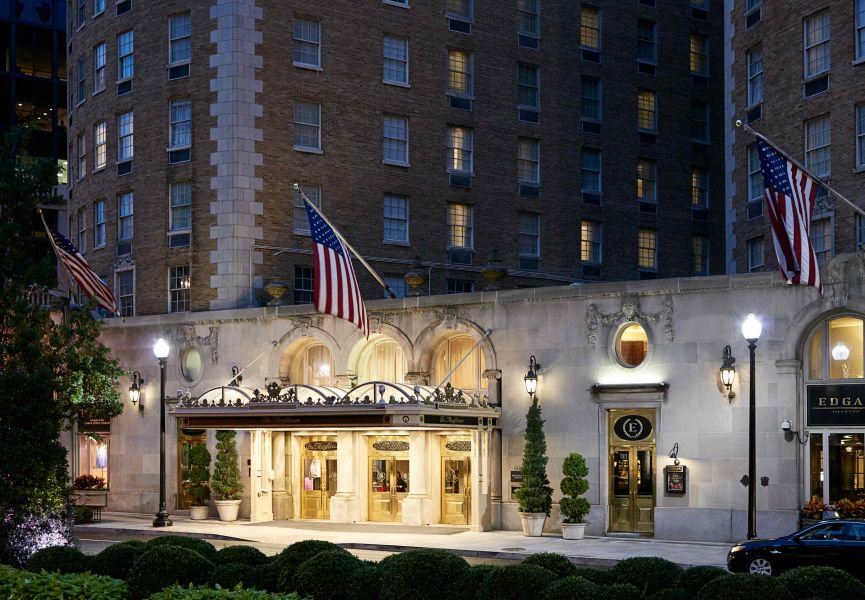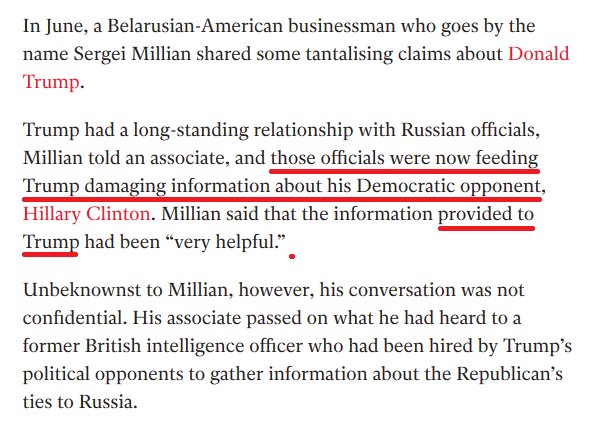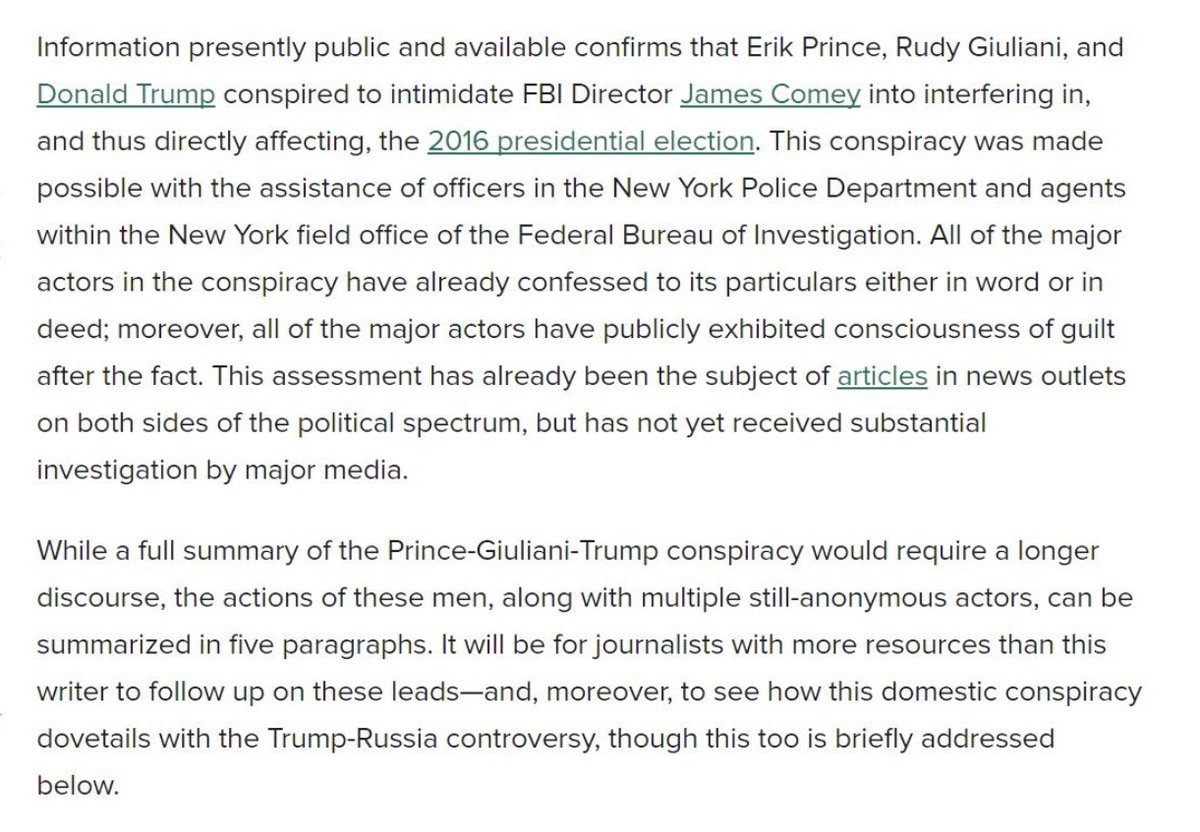

It also explains why Trump was so frustrated when the Kremlin didn't give Don the emails in June.
He'd already promised Russia a "good deal" on sanctions if they'd be a "friend"—he said he'd "reward" friends—but he felt they hadn't delivered enough.
I will return *immediately* after with more.
Next topic up in this thread: whether Papadopoulos interfaced directly with Trump (spoiler: he *did*, multiple times), and what level of authority he was given. The NYT story contains major breaking news on both fronts.
But first, consider the contact we *know* Papadopoulos had with Trump at the TIHDC meeting on March 31, 2016. Here's the second of three threads I did on that subject many weeks ago:
This feed is 1 of 92 Papadopoulos follows—1 of 58 political journalists or media organizations—and I think I know why.
And this was a time he was working on setting up a Trump-Putin meeting.
I apologize, but I'm a huge Wisconsin Badgers fan (PhD, 2016) and I'm watching the Orange Bowl.
Either Kammenos passed messages or Papadopoulos met Putin's aides/Putin.
1. Papadopoulos' boasts were *true*. True when made to an Australian, *and* true when made to Greeks. That's now accepted.
2. At least one foreign intel agency knew of the Russia plot in April 2016—two months before Christopher Steele sent (pro bono) *anything* to the FBI.
3. Media is finally conceding what attorneys have been saying for months now: because stealing Clinton's emails was a federal crime, the Trump campaign was unable to reward—or negotiate any unilateral benefit with—Russia once it had that knowledge without it being collusion.
4. Media now concedes Trump himself—not merely Trump aides—lied about Papadopoulos' role with his campaign after it was revealed Papadopoulos told Mueller everything he knows. And Trump specifically lied to hide that Papadopoulos was authorized to set up high-level meetings.
5. Media now concedes what independent journalists have previously noted—Papadopoulos was switched to Trump's Russia team *immediately* after he told Trump he was a Kremlin intermediary, though it wasn't his area of expertise.
And this was intended as a *signal* to Russia.
6. We now know Papadopoulos' "goal" was to set a meeting between Trump and Putin or Trump aides—like himself—and Putin aides. We know he was authorized to set up a high-level meet of the former sort and had the opportunity for the latter sort of meeting in Athens in May '16.
7. We know Papadopoulos—who had nearly no experience—somehow got an interview with *Trump National Co-Chair Sam Clovis* within days of his old boss Ben Carson conceding during the primary. We now know he had sufficient ties with Sergei Millian that could've facilitated this.
8. We know from this March '17 article in The Independent (UK) that Millian was not only close to Papadopoulos but told a source of Christopher Steele's that stolen Russian information *was* given to Papadopoulos and it *was* given to Donald Trump himself and it *was* used.

9. We know Papadopoulos was in touch with RIAC head Ivan Timofeev by April 2016, and the RIAC appears to be known to the CNI, which hosted the Mayflower Speech Papadopoulos helped write and invited Kislyak (breaching diplomatic protocol) to hear it. russiancouncil.ru/en/analytics-a…
10. We know the NYT inexplicably cites participants in the TIHDC meeting for the proposition that Trump "deferred" to Sessions on a meeting with Putin, though those participants the NYT trusts are known—see The Daily Beast—to have lied about what occurred during the meeting.
11. We know Sessions' claim the campaign thought Papadopoulos "too unqualified" to set up a key foreign meeting is bunk, as within 48 hours it sent him to Israel to meet important foreign leaders, then Greece, then let him set up Trump's meeting with the Egyptian President.
12. We know, from the NYT, Trump's National Co-Chair Clovis "encouraged" a known Kremlin intermediary he'd inexplicably kept on the NatSec team to go to Moscow *post-hacking* to negotiate sanctions with the Russians, which fact alone—if we knew *nothing else*—*is* collusion.
13. We know Trump asked multiple agents of the Russians—not just Papadopoulos but Burt—to craft the Russia policy he unveiled at the Mayflower. It seems clear the campaign orchestrated Kislyak hearing that speech *and* meeting Trump as a VIP before it.theguardian.com/us-news/2017/j…
14. And we know Jeff Sessions lied under oath about his contacts with *both* George Papadopoulos and Richard Burt, which is why I've said for months now that Sessions is a "LVL2" target for Mueller along with Kushner, Trump Jr., Manafort, and Flynn.politico.com/story/2016/10/…
15. We know, from the NYT, that Stephen Miller—who helped orchestrate Comey's firing, obstructing the Russia probe—was instrumental in promoting Papadopoulos as a Russia surrogate. It's *wildly* implausible those two facts aren't related. Miller becomes a key Russia witness.
16. We know Papadopoulos committed a firing offense in causing an international firestorm with England entirely of his own making, and it seems Trump's staff would've wanted the young, inexperienced Papadopoulos fired right then—but someone *above Clovis' level* blocked it.
17. We know Papadopoulos told Greek media he thought he was temporarily thrown off the campaign—but again, critically, *not fired*—because of an interview he gave with Russian media in September without permission. We know he was asked back—by whom?—days before the election.
18. We know Papadopoulos was a) impervious to firing, b) the beneficiary of Trump's only "blank check" job offer and c) the *one* person on Team Trump who knew for *certain* Russia had committed crimes and was told this *before* the Mayflower Speech.
Three *related facts*.
19. Papadopoulos helped edit Trump's "good deal for Russia" speech *after* he knew Russia had committed crimes against America. Assuming Papadopoulos passed that key information on to his boss—and *every indication* is he did and Trump *appreciated* it—that's your collusion.
20. We know within 24 hours of learning Russia had committed crimes, Papadopoulos wrote Miller—his Trump liaison—that he had "interesting messages" from Russia. Of *course* he didn't say what they were over email—the "messages" were knowledge of a crime. Did they chat later?
21. Miller was at the Mayflower Speech and *helped Papadopoulos write it*. Does *anyone* believe that—while working together on the biggest speech of Trump's life, a speech in big part about Russia—Miller never asked what the "messages" were, and Papadopoulos never told him?
22. We know—from the NYT—there was an administrative bias at the FBI with a pro-Trump effect: the FBI consciously deviated from investigative protocols to ensure its investigation of Trump didn't harm his chances of victory. Clinton got no such consideration in October 2016.
23. We know—from the NYT's worst buried lede here, given its headline—that "Steele had shown some of his findings to an FBI agent in Rome [in July 2016], but that information was not part of the justification to start an counterintelligence inquiry, American officials said."
24. We now know, from today's NYT article, that there was a *third* pre-inauguration overture to Trump—from Russian agents—about building a "Trump Tower Moscow": the first, from Agalarov in 2013; the second, from IC Expert (Rozov) in 2015; now the third, by Millian, in 2016.
25. Finally, the NYT reveals Papadopoulos—a member of the public NatSec team Trump let American voters know about—did indeed have multiple contacts with the head of the "private" NatSec team Trump relied on during the campaign, whose key members were Flynn and Erik Prince.
Feel free to check back in with me on that prediction, as it's based on a year of research into all that is now known on this topic. {end}



